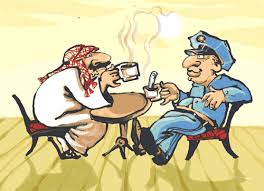January 15th, 2010

As the battle rages between the political government and its rival, popularly known as the establishment, the public silently awaits the final result.
For some, the civilian government has already lost because its capacity to influence policymaking or make decisions without interference has diminished. National security, foreign policy and all strategic decisions are not being made in the presidential palace anymore.
One of the key indicators of this is that the president has deviated from the alternative vision in terms of regional politics and certain other issues that he initially pursued. Now, it is back to the establishment’s agenda, something he needs to do to buy time for his personal survival.
However, incapacitating the president from a policymaking and administrative perspective does not seem to satisfy the establishment which has gone for the PPP leadership’s jugular. The top man of the party has to go at all costs. Even if he survives the onslaught for a while or until the end of his legal term, he would have bled profusely.
This is not a new battle. It has been going on between different individuals versus the establishment for over 50 years. The difference lies in the various actors’ ability to stomach a fight and juggle the different players to survive. It’s a battle fought in space and time.
Why is the establishment so powerful? Because of its character and ability to develop meaningful partnerships. Most people think of the establishment as the military only. This is not wholly correct. But considering the dominance of the defence services neither is such a perception altogether misplaced.
The establishment is not a static entity. It has evolved over the years with newer members joining in and becoming more significant than others. However, a distinction must be made between the core, peripheral and associate members. It is the core members that moderate and control the dynamics of the establishment while the peripheral ones provide support to the system without determining the direction of the working of the establishment. The associate members are taken on board when the need arises.
The core members include senior members of the military and civil bureaucracies, select politicians, media houses and some key economic players. While the military and civil bureaucracies are easier to identify because they have a formal organisational shape and well-defined institutional interests, other actors such as politicians and the media are not so easily captured.
There are some politicians whose primary job it is to watch out for the interests of the establishment and tip the balance within their respective parties in favour of the establishment in case there is any threat to its interests. Each party has such members. So, while a party in power may consider itself as representing the ultimate power and being the establishment, it has some in its ranks who form the core while others including the top bosses may belong to the other two categories.
Part of the media is a core member but it is also divided between the other two categories. For instance, the ownership of media groups had always been part of the core group of the establishment. The editorial teams, on the other hand, did not follow a single path i.e. not all had links to the establishment. There were always some editorial groups with peripheral members while others remained independent.
However, as a professional group, the media was considered too important to be left out of the system and so was brought into the fold completely in the past decade. Proactive engagement with the media was planned to ensure uniformity in terms of alignment between the editorial teams of the media and the establishment. Along with the media as an institution, key intellectuals, academics and opinion-makers have also become part of the peripheral group.
The system is intelligent: it doesn’t resemble that of the former Soviet regime. People are often confused by the various debates in the media that gives an impression of independence. Views can differ and internal battles within the establishment can also surface through the media but this does not mean a qualitative difference of opinion.
Members of the media can support certain political positions or individuals without necessarily wanting to change the overall system in a way that the establishment becomes less significant. And so certain political actions can become a means to negotiate power within the core group of the establishment rather than signify a major systemic change.
It must also be noted that there are some other state institutions, including the judiciary, that are taken on board on a need-be basis. Historically, the judiciary was brought on board to endorse the legitimacy of the system and so the group has associate membership of the establishment. The militant groups on the whole also belong to the category of associate members which means that these can be abandoned or their significance reduced once they are not needed any more. However, a distinction has to be made between the militant groups and those among their leadership who have become part of the peripheral group just like the religious parties.
Another feature of the socio-political system driven by the establishment is that it is largely informal which means that there are no institutionalised modes of communication. A lot depends on signals. Also, an individual, though he/she may be part of the core group, could lose his/her significance if found to deviate from the interests or ideology of the establishment. The system then kicks in to push out the deviant member.
Even the topmost member of the military has been pushed out once he abandoned the principles. The most recent example is Pervez Musharraf who became irrelevant for the establishment once he deviated from certain key principles and embarked upon policy change. The establishment is not a monolith, but it comes together as soon as its interests are threatened. Understanding this dinosaur is necessary before its power is contested.
The writer is an independent strategic and political analyst.
Source: Dawn